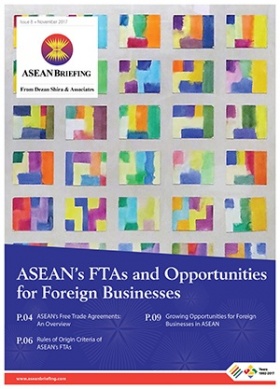Singapore Signs Upgraded Free Trade Agreement with China
Singapore and China has signed an upgrade of their bilateral Free Trade Agreement (FTA). Chinese Premier Li Keqiang and Singapore’s Prime Minister Lee Hsien Loong signed the upgrade of the 2009 China-Singapore Free Trade Agreement (CSFTA) on November 12, 2018 in Singapore.
The expanded CSFTA is expected to deepen trade and investment between the two countries, while affording Singaporean firms expanded market access in China. The upgraded CSFTA will come into force once relevant domestic procedures are completed in both countries.
The China-Singapore Free Trade Agreement (CSFTA)
CSFTA was the first comprehensive FTA to be signed by China with another Asian country. It largely focuses on liberalization of trade in goods.
Outside of the CSFTA, Singapore is also a FTA partner of China by way of its membership of the Association of Southeast Asian Nations (ASEAN), which has signed a FTA with China – the FTA with ASEAN (ACFTA)ASEAN-China Free Trade Area (ACFTA). However, the ACFTA is not as comprehensive as the CSFTA.
The CSFTA eliminates tariffs for up to 95 percent of all Singaporean exports to China.
Besides this Singapore investors have preferential access to invest in China’s healthcare system. Free movement for various kinds of professionals is also allowed by the agreement.For China, the CSFTA eliminated tariffs on all Chinese exports to Singapore. While most sectors were already tariff-free for China, certain industries, like beer producers, gained much from the deal. China was also afforded greater access to investment in Singapore’s education services industry.
In 2015, the official plan for upgrading the CSFTA was launched during the visit of Chinese President Xi Jinping to Singapore and concluded after several rounds of negotiations in recent days.
The upgraded CSFTA
The upgraded CSFTA mainly focuses on investments. It implements specific provisions for investors such as those related to tax refund, minimum treatment and transfer clauses. A more robust Investor-State Dispute Settlement (ISDS) mechanism is also incorporated in the agreement.
Regarding express delivery, environment, air transport, legal, construction and shipping service, the upgraded FTA contains further trade commitments.
Three new chapters – e-commerce, competition policy and the environment – are newly included in the CSFTA.
The e-commerce chapter contains the commitment to develop an international regulatory environment to enhance e-commerce. Both sides agreed on several technical aspects of e-commerce such as electronic authentication and online consumer protection.
The competition policy chapter states that both nations will ensure fair competition and strengthen their cooperation in the enforcement of competition law.
The environment chapter ensures deeper cooperation amongst the two states in the respective fields. Furthermore, it contains specific provisions to avoid reducing environmental standards for trade protection purposes.
The importance of the upgraded FTA for Singapore
China is Singapore’s largest trade partner, with bilateral trade totaling to US$137.1 billion in 2017.
China is also the top destination for foreign investment originating from Singapore, while China has stepped up investments in Singapore as part of its Belt and Road Initiative.The upgraded CSFTA expands bilateral cooperation to the service sector which is highly important for Singapore as it contributed over 70 percent of the country’s GDP in 2017.
Further, Singaporean investors will gain greater investment protection in China and benefit from improved trade facilitation.
About Us
ASEAN Briefing is produced by Dezan Shira & Associates. The firm assists foreign investors throughout Asia and maintains offices throughout ASEAN, including in Singapore, Hanoi, Ho Chi Minh City and Jakarta. Please contact us at asia@dezshira.com or visit our website at www.dezshira.com.
- Previous Article 如何在新加坡办理工作许可
- Next Article Growing Opportunities for Foreign Investors in Indonesia – New Issue of ASEAN Briefing Magazine








